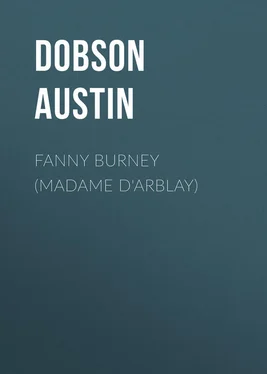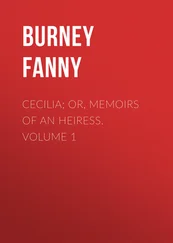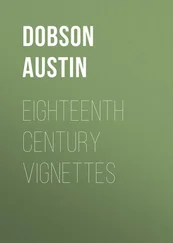Austin Dobson - Fanny Burney (Madame D'Arblay)
Здесь есть возможность читать онлайн «Austin Dobson - Fanny Burney (Madame D'Arblay)» — ознакомительный отрывок электронной книги совершенно бесплатно, а после прочтения отрывка купить полную версию. В некоторых случаях можно слушать аудио, скачать через торрент в формате fb2 и присутствует краткое содержание. Издательство: Иностранный паблик, Жанр: foreign_antique, foreign_prose, на английском языке. Описание произведения, (предисловие) а так же отзывы посетителей доступны на портале библиотеки ЛибКат.
- Название:Fanny Burney (Madame D'Arblay)
- Автор:
- Издательство:Иностранный паблик
- Жанр:
- Год:неизвестен
- ISBN:нет данных
- Рейтинг книги:5 / 5. Голосов: 1
-
Избранное:Добавить в избранное
- Отзывы:
-
Ваша оценка:
- 100
- 1
- 2
- 3
- 4
- 5
Fanny Burney (Madame D'Arblay): краткое содержание, описание и аннотация
Предлагаем к чтению аннотацию, описание, краткое содержание или предисловие (зависит от того, что написал сам автор книги «Fanny Burney (Madame D'Arblay)»). Если вы не нашли необходимую информацию о книге — напишите в комментариях, мы постараемся отыскать её.
Fanny Burney (Madame D'Arblay) — читать онлайн ознакомительный отрывок
Ниже представлен текст книги, разбитый по страницам. Система сохранения места последней прочитанной страницы, позволяет с удобством читать онлайн бесплатно книгу «Fanny Burney (Madame D'Arblay)», без необходимости каждый раз заново искать на чём Вы остановились. Поставьте закладку, и сможете в любой момент перейти на страницу, на которой закончили чтение.
Интервал:
Закладка:
At the time of her father’s second marriage, Fanny Burney was in her sixteenth year. Whether she had written much previous to the return of her sisters from Paris, cannot be affirmed; but it is evident that, with the advent of the diary-keeping Susanna, her native bias to scribbling rapidly increased. Every available scrap of paper was covered with stories and humourous sketches, confided only to the discreet ears of the younger sister, who laughed and cried over these masterpieces in secret. But it so chanced that Mrs. Burney the second, with all her appreciation of the monde parleur , was also keenly alive to the misères du monde scribe . Something led her to suspect that the girls were writing a good deal more than in her opinion was good for them, and the result was that they were gently but firmly admonished not to spend too much time in idle crude inventions. Thus, one fine day, it came about that, in the paved play-court at Poland Street, when her father was at Chessington and her step-mother at Lynn, the docile Fanny “made over to a bonfire” all her accumulated stock of prose compositions. In the Preface to her last novel of The Wanderer , where it is added that Susanna stood weeping by, the date of this holocaust is given as her fifteenth birthday (June 1767). But as it obviously occurred some time after her father’s second marriage in October of the same year, her memory must have deceived her. Among the papers she burned was said to be an entire work of fiction, to which we shall return. Luckily, – although by this act she provisionally abjured authorship, and the discredit supposed to attach in the polite world to female writers and female writers of novels and romances in particular, – she did not refrain from journal-keeping. For the date of her first entry in her Early Diary is May 30 [1768], at which time Mr. Burney’s second marriage had been publicly acknowledged.
Before dealing with those portions of this chronicle which concern the present chapter, it is necessary to say something of the proceedings of the father of the family. In 1769 Mr. Burney, of whom we shall hereafter speak as “Dr.” Burney, received his Mus. D. degree at Oxford, his preliminary exercise being an anthem which was performed in the Music School, where it “was received with universal applause.” 9 9 Oxford Journal , 23 June 1769.
The chief vocalist was one of the Doctor’s pupils, Miss Jenny Barsanti, often referred to in the Diary ; and Fanny wrote some congratulatory verses to her father on his distinction, which, at all events, exhibit a knack of rhyming. The receipt of his degree appears to have revived all Dr. Burney’s dormant literary ambitions. In matters connected with his profession he had always been an industrious note-taker; and he was also much interested in astronomy. One of the results of this last taste was an anonymous pamphlet prompted by the comet of 1769, at the close of which year it was published. To this was appended the translation from Maupertuis by the first Mrs. Burney, of which mention has been made. The Essay on Comets attracted no notice; but it served to strengthen its author’s hand; and he began systematically to look over the miscellaneous collections he had accumulated towards that History of Music of which he had dreamed at Lynn. In arranging and transcribing the mass of material, Fanny fell naturally into the office of amanuensis and keeper of the records. But these had not long been manipulated before her father discovered that it would be necessary for him to make a personal tour in France and Italy, – first, to procure information in regard to ancient music, and secondly, to ascertain, by ear and eye, the actual condition of the musical art on the Continent. At Paris he visited Rousseau and Diderot, both of whom were interested and helpful. At Ferney he had a chance interview with Voltaire, then seventy-eight and wasted to a skeleton, but still working ten hours a day, and writing without spectacles. Discord, rather than harmony, was the topic of this conversation. The quarrels of authors – Voltaire held – were good for letters, just as, in a free government, the quarrels of the great and the clamours of the small were necessary to liberty. The silence of critics (he said) did not so much prove the age to be correct, as dull. Dr. Burney had started in June 1770; he did not return until January 1771, when he almost immediately buried himself at Chessington to prepare his notes and journal for the press. In the following May his book was printed under the title of The Present State of Music in France and Italy; or, the Journal of a Tour through those Countries, undertaken to collect Materials for a General History of Music ; and it obtained a considerable success. Copies went to Mason, Hawkesworth, Garrick, and Crisp, all of whom had aided in its progress. Among its other readers must have been Johnson, who told Mr. Seward that he had “that clever dog, Burney” in his eye when, two years later, he wrote his own Journey to the Western Islands of Scotland . 10 10 Dr. Birkbeck Hill (Boswell’s Johnson , 1887, iv. 186 n.) seems, perhaps not unnaturally, to doubt this, as Burney “writes chiefly of music.” But it is confirmed by a passage in the Early Diary , 1889, i. 212. “He [Baretti] told my father that Dr. Johnson.. has read both his Tours with great pleasure, and has pronounced him to be one of the first writers of the age for travels!” Moreover, in the second Tour, the author was less chary of personal anecdote. In Edward FitzGerald’s letters, he draws Carlyle’s attention to some of the very interesting particulars which the second Tour contains concerning Frederick the Great ( More Letters of Edward FitzGerald , 1901, p. 67). But Carlyle, who quotes the visit to Voltaire from the first Tour, does not mention the second at all.
During Dr. Burney’s absence abroad, his wife had found the Poland Street house too small. She accordingly fixed upon a fresh residence in Queen Square, Bloomsbury, which was then much more in the country than it is at present. The new home was at the upper end of the square, which had been considerately left open by the architect so as to afford a delightful prospect, across Lamb’s Conduit Fields, of Highgate and Hampstead, which Miss Burney – we regret to say – spells “Hygate and Hamstead.” There was also a special interest in the house itself, for it had once been inhabited by Queen Anne’s printer, Alderman Barber, the “ Johannes Tonsor ” and “very good and old friend” of Swift; and it was a fond tradition of the Burney household that the author of Gulliver’s Travels had often dined with Barber at Queen Square. But the Journal to Stella , when it mentions Barber, invariably refers to him as in the City; and it is probable that Swift visited him uniformly at his place of business. In any case, the Queen Square house was “well fitted up, convenient, and handsome.” Especially was there a closet or playroom up two pair of stairs where Fanny could retire to compose her Diary, for which task, during her father’s absence abroad, she had unexpected opportunities. But she had also another, and more picturesque asylum in her step-mother’s dower-house at Lynn. At the end of a long side garden was a “Look Out” or Gazebo, called “The Cabin,” from which ships could be seen on the Ouse. Here, except when she was driven from it to the more secluded garden by the profane language of the seafaring population, she was accustomed to write and dream at her ease.
Dr. Burney’s activity did not permit him to pause long after his first book. Very soon we hear that he is learning German, – no doubt with a purpose. In July, 1772, he set out upon a second tour, this time to collect materials for his history in Germany and the Netherlands. During his absence, which lasted five months, his family lived mainly at Lynn and Chessington. In December he returned to England, terminating his travels by an unique experience. Upon his passage to Dover, in the very stormy winter of 1772, he was so exhausted by sea-sickness that he fell asleep in his berth, and was carried back again to Calais. On reaching Queen Square he had a severe illness, requiring to be carefully nursed by his family; but, with his customary energy, dictated to his daughters, from his bed, portions of the new Tour whenever the intervals of pain permitted him to do so. As soon as he was convalescent, he hastened off to Chessington, carrying his secretaries with him. The result of his labours was at press in February, 1773, and was published in May. It was received even more kindly than its predecessor, and included detailed Proposals for the forthcoming General History of Music . Not many months after, in consequence of difficulties as to title, the Queen Square house was given up, and the Burneys moved to Leicester Fields.
Читать дальшеИнтервал:
Закладка:
Похожие книги на «Fanny Burney (Madame D'Arblay)»
Представляем Вашему вниманию похожие книги на «Fanny Burney (Madame D'Arblay)» списком для выбора. Мы отобрали схожую по названию и смыслу литературу в надежде предоставить читателям больше вариантов отыскать новые, интересные, ещё непрочитанные произведения.
Обсуждение, отзывы о книге «Fanny Burney (Madame D'Arblay)» и просто собственные мнения читателей. Оставьте ваши комментарии, напишите, что Вы думаете о произведении, его смысле или главных героях. Укажите что конкретно понравилось, а что нет, и почему Вы так считаете.












